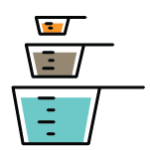To many students, math related topics can be confusing and discouraging. If left unchecked, these feelings will sow seeds of fear and low self-esteem– affecting a student’s future success in education and determining their career paths later in life.
Athlos has compiled a few tips and tricks that can help both parents and children develop optimism and curiosity about the field of mathematics.
Here are five ways you can help your family become interested in math outside the classroom:

Encourage questions and curiosity.
Children are full of questions, sometimes they can be math or data related. Take advantage of these occasions and turn them into learning opportunities by diving into the questions and helping them find the answers. Doing this not only helps foster an interest in math, but it also shows that you value your child’s interests.

Avoid speaking negatively about math.
Many adults have had negative experiences with math and their attitude often reflects onto their children. Even if your poor experience is true, try to be a good example for your students by approaching math with confidence, an open mind, and a growth mindset.

Take a field trip.
Whether it’s a small tour of a local factory or far away on a family vacation, take opportunities to ask questions about how math is used in the facility, when, and why. Doing this helps children understand the “why” of math. A few places that often use mathematics are: bakeries, science museums, dairy farms, aquariums, and local banks.

Involve children in day-to-day math problems.
You can do this by showing where and how math is used in your life. Tasks can include:
- Organizing and managing a daily schedule. If the appointment is at noon, approximately what time do you need to leave?
- Calculating the final price of an item based off the percentage it’s on sale for. Is 20% off a good deal, and what is the actual cost of the item?
- Comparing the value of two different sized items of the same product at a grocery store. Does it really save you more to purchase the larger item?
- Measurements for cooking and baking family meals. What if the recipe needs to be doubled or one and a halved?

Relate math to your child’s interests.
Most every career field involves a small amount of math. As children develop general interests, look for ways you can relate math them. You can help them explore the use of coding in computer software, how sports records for every player are calculated and recorded, and how clothing includes fabric measurements and material costs. The more a student recognizes math in their interests, the more comfortable and confident they will become around it.

















